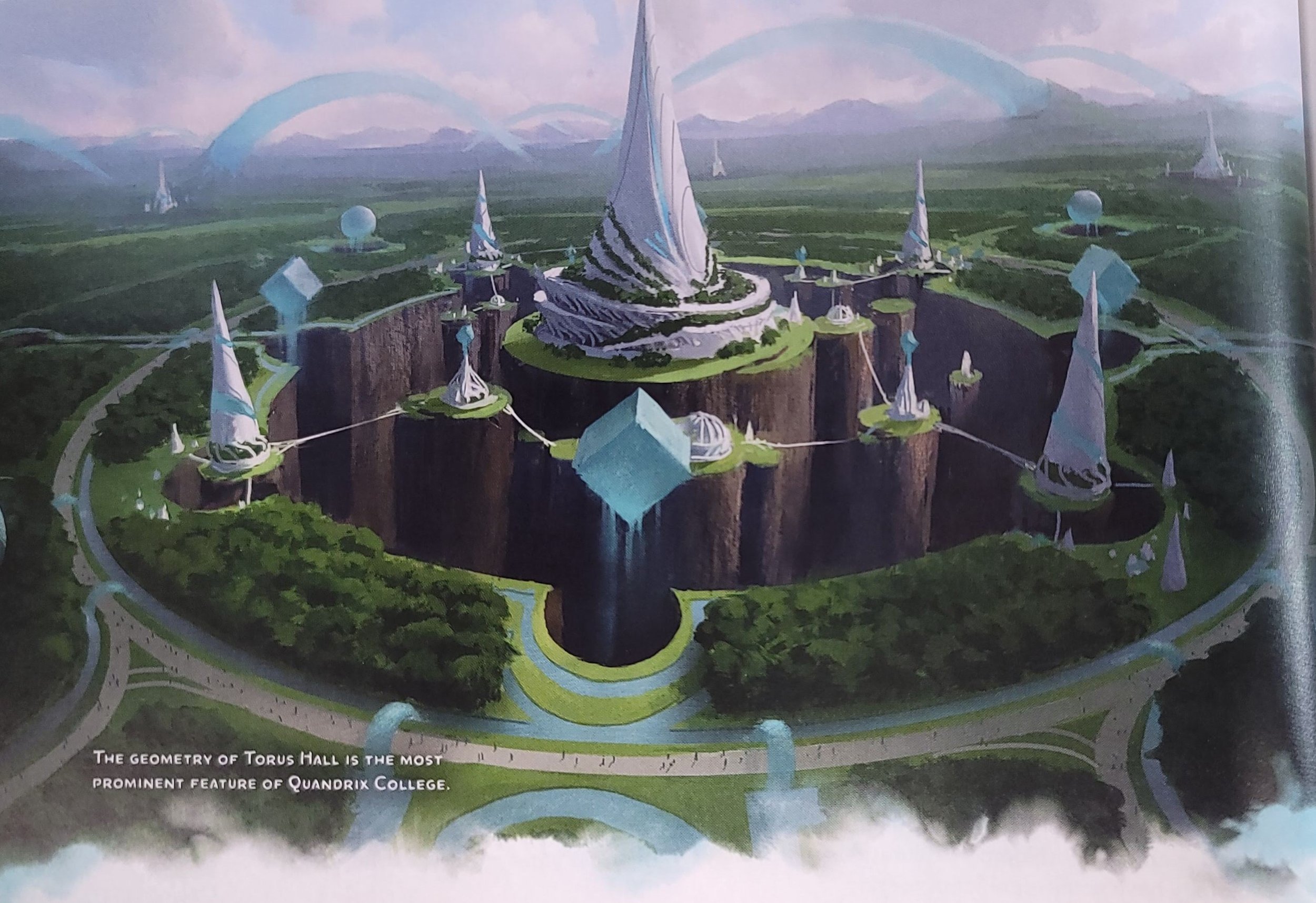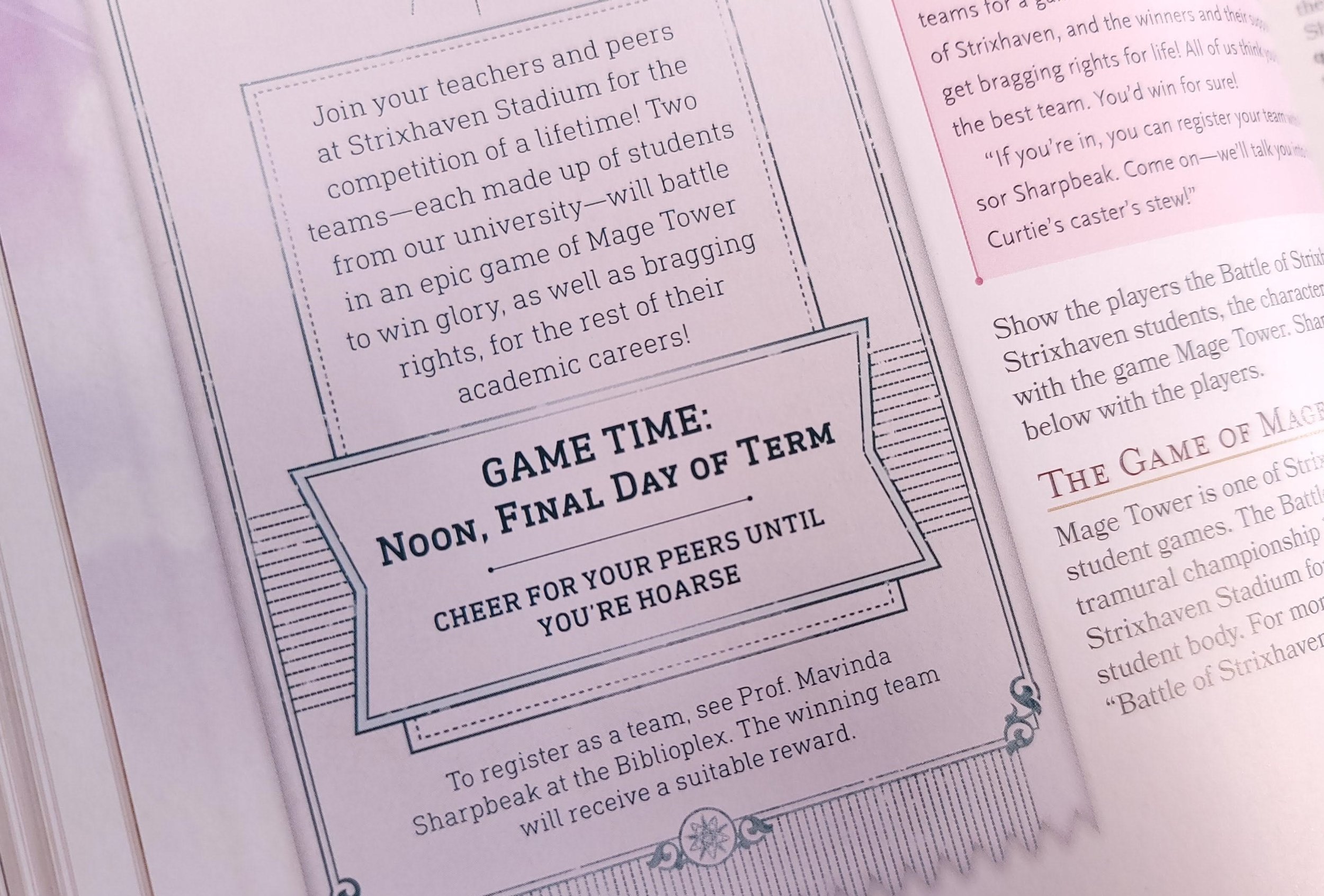It's D&D, but with Magic! - Strixhaven review (D&D5e)
By Chris Renshaw
Do you ever have those campaign planning sessions where everyone is taking forever trying to figure out what class to be? You *really* want to be a wizard, but so do 2 or 3 other players. And you're just waiting for the others to say "ok I'll pick another class…"
Or….
Maybe you are *really* into Harry Potter. You also happen to like D&D. You've just always had a desire to run a Harry Potter themed adventure and/or campaign….
Or…
Maybe you just have to have every D&D book that Wizards comes out with.
Either way, have I got a book for you! Strixhaven: A Curriculum of Chaos is the latest in the line of sourcebooks blending Magic and D&D (joining Theros & Ravnica). I'll TL;DR this one - I expected this to be just a Harry Potter rip off but was pleasantly surprised at how good the book was.
What is Strixhaven?
It's Hogwarts. No, really. You ever see those movies like "Transmorphers" that are basically rip-offs of other popular properties but are legally distinct enough? That's the difference between Harry Potter and Strixhaven. If I were to do a word association game and say "Hogwarts", you'd probably quickly rattle off the words "Magic", "Quidditch", or one of the four houses. Well, Strixhaven is a university where student learn magic under the study of older mages. Sound familiar? According to this book, the university was "founded seven centuries ago by five ancient dragons". Guess what? Those five dragons are represented by the five different houses….err "colleges" that make up the university. Convinced yet? Well, what if I told you it had Quidditch? Technically it's called "Mage Tower", but it’s a magical sport where teams play against each other.
I get it, its Hogwarts. So what?
Setting aside those concepts, that's where most of the comparisons stop. Unlike in HP, the different colleges of Strixhaven are not represented by personality types but are based on schools of magic. Basically, the colleges are different subjects….but with Magic! There's Lorehold, which is History…but with Magic! Prismari is for the Arts…but with Magic! Quandrix is Math…but with Magic! Silverquill is language/literature…but with Magic! And Witherbloom is Health class…(repeat after me) but with Magic!
I joke on how basic those concepts are, but it's probably designed to be that simple on purpose: nobody likes an sourcebook full of too complicated lore (at least I don't). In fact, the concept is basic enough that you don't *have* to be a wizard or sorcerer to attend Strixhaven. While that might seem paradoxical, the way the colleges are laid out the writers have made it so that other classes can be a part of Strixhaven, given the right class selections. For instance, in the book they use the example that a Barbarian with the "Path of Ancestral Guardian" would work in the Lorehold college. So your game doesn't have to be a Harry Potter ripoff - it just means that magic will play a big part in your campaign.
It's College…but with Magic!
I love reading these at the bottom of the copywrite page
Alright, I promise I'll stop. Getting into the details about Strixhaven, of course the first chapter is all about the University itself, defining the lore and history of Strixhaven and going into the details of each of the five colleges. The book provides sample areas of study for DMs to use to help generate NPCs, along with descriptions of a few teachers in each college to help fluff out your adventures. Maps and the high quality of artwork you come to expect from a D&D book help bring the university to life. Chapter 2 continues the typical D&D pattern of laying out different character options. When I first read the book, I was surprised that this section was only about 10 pages long! Isn't that the part people want the most from this book is the new options it presents?
Eh, maybe in previous books, but once you move into Chapter 3 you see the real draw of the book: changing how you *play* D&D, not the characters you play *with*. This is when I realized the real value in Sourcebooks like these - many RPGs (very much including D&D) use sourcebooks as a way to just list more stuff. They may have different names, but they are some form of "Player's Handbook" or "Monster Manual", and a number (or for your Pathfinder folks, "Bestiary" and a number). The book might be called "Xanathar's Guide to Everything", but that's just because it sounds better than "Player's Handbook 2". More spells, more settings, more items, more monsters - that's what most sourcebooks do.
To be fair…
Strixhaven does this too - it's just that it's not *all* it does. Strixhaven gives you the tools and options to alter the gameplay of D&D itself. It's not "how do we fit college life into a D&D game", its "how do we alter D&D so we can play characters in college". There's a section on relationships, and not just in a romantic way, where you map out different NPCs that characters interact with and how many "relationship points" the characters have with them. How strong the relationship can grant boons or penalties to the player characters. Over the course of their studies, characters earn "Student Dice", which are D4's that can be saved and used as a bonus to an ability check.
The book also has a bunch of "extracurricular options", or clubs that the players can join. These provide extra avenues of role playing throughout your games, but also provide a mechanical benefit because they also provide student dice. Just don't get put into detention! If your characters mess up too much during their adventures and attract the attention of the faculty, then they get put into detention - which means they can't participate in extracurriculars and lose those student dice!
Wrapping up…but with Magic!
Sorry, I couldn't resist one more. The remainder of the book reverts back to the D&D formula of providing a sample adventure for showing how these tools can be used. It even steps back into the Harry Potter formula by giving you a reoccurring "Big Bad" that the students end up stopping year after year that turns out to be a former student. But these adventures use settings and places that show off the gameplay changes (prom, for instance, or a game of Quidditch Mage Tower).
My guess is that those that don't like the book is because of the changes it offers, those people preferring that their D&D stay how it is. If so, maybe they don't realize the changes are optional? It even says in the book that you don't even have to use the relationship/extracurricular rules if you don't want to. Overall, if you enjoy D&D but are tired of the same type of campaigns, I really think you might want to check this book out (affiliate link). Even if you don't follow it 100%, you might get some good ideas that breathe new life into your games. (Also, keep an eye on my social media, as I've got a special edition version to give away).
Note: I generally assume I know nothing. So if I've missed something, let me know in the comments. Or let me know on Twitter or Facebook. If you like these types of posts, consider subscribing to our patreon….but with Magic! (teeheehee)





